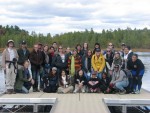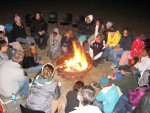Several Long Term Ecological Research (LTER) sites have been rather successful in attracting and engaging culturally diverse students, especially among K-12 audiences and, to a lesser degree, undergraduate students. However, there is general consensus that there is no current structure within the Network to specifically expand diversity of student participation in the wider LTER community. This was one of the issues raised at an Ad-Hoc Working Group session held during the 2012 LTER All Scientists Meeting (ASM) in Estes Park, Colorado.
The Working Group was convened by Teresa Mourad, the Director of Education and Diversity Programs at the Ecological Society of America (ESA), to explore ways for more students from diverse backgrounds to participate in LTER science and to strengthen the long standing SEEDS – Strategies for Ecology Education, Diversity and Sustainability – partnership with LTER sites. Since 2003, SEEDS students have made field trips to 10 LTER sites with support from the National Science Foundation (NSF). Two weeks after the ASM, another group of 24 SEEDS students visited the 11th LTER site, Cedar Creek, which is home to the longest running oak savannah and grassland prescribed burn investigations and one of only six BioCON (Biodiversity, CO2, and Nitrogen) experimental sites in the U.S.
Access to financial resources, parental and peer pressure on academic choices, isolation and lack of role models are among the challenges that underrepresented minority students face in ecology. In the sciences, students need to learn a wide variety of skills, including how to do research and how to make presentations. SEEDS field trips and Leadership Meetings, for instance, have included career panels, research presentations, and indigenous and minority speakers.
Challenged, and encouraged, by the NSF BIO’s Advisory Committee 30-year review, which highlighted diversity as a priority, we noted that the LTER Strategic Implementation Plan mentions diversity in only one goal area, but that there is room for diversity initiatives to be developed across the network and during the ASMs. An interesting question to ponder: can LTER Research Experience for Undergraduate (REU) programs, SEEDS, and graduate level programs be more connected?
The Working Group also raised issues about other dimensions of diversity, including income, sexual orientation and gender identity, geography, and first generation college students. It inspired a second conversation, spearheaded by Daniel Nidzgorski, at the LTER Education Committee’s Higher Education workshop, as well as several informal discussions among some LTER Principal Investigators.
Acting upon this renewed interest in diversity, the LTER Education Committee is set to conduct a survey of existing diversity efforts at LTER sites sometime in 2013. A small group has been formed to follow up on ideas for a network-wide diversity initiative. This group has developed a proposal for a Working Group to synthesize current strategies and resources supporting students and recommend next steps for building on this base to support a diverse LTER community across all positions and career stages.
A new listserv of interested attendees (diversity@lternet.edu) has also been created for all to stay informed. To join, simply use the feedback button on the LTER website (www.LTERnet.edu) or email tech-support@LTERnet.edu.
For more information, please contact: Teresa Mourad, teresa@esa.org or Daniel Nidzgorski (CDR) dnidz@umn.edu
By Teresa Mourad (ESA)

 Enlarge this image
Enlarge this image
